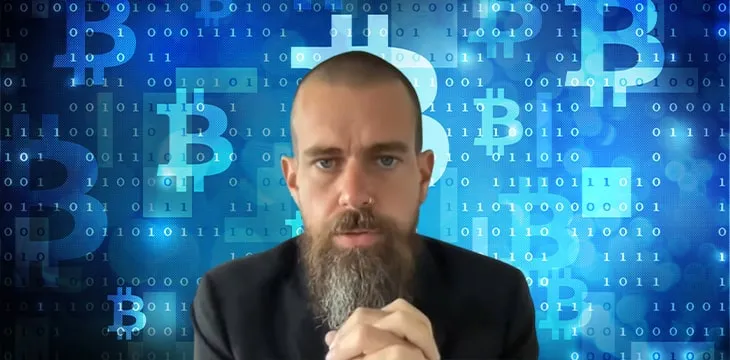|
Getting your Trinity Audio player ready...
|
Jack Dorsey’s digital payments company Block (formerly Square) is generating tons of BTC-related revenue but channeling only a tiny portion of that to the company’s bottom line.
Figures released last week show Block generated revenue of nearly $4.1 billion in the three months ending December 31, 2021, up nearly 30% from the same period the previous year. However, the company booked a net loss of $77 million for the quarter, down from a $294 million profit in Q4 2020, although that profit was goosed by a $255 million gain in the company’s investment in food delivery platform DoorDash.
Block introduced a new feature last December that allowed users to send BTC from their Cash App balances to friends and family, a step that Block views as a means of furthering BTC adoption and hopefully convincing customers to explore other Cash App products.
While nearly half ($1.96 billion, +12% year-on-year) of Block’s Q4 revenue came from its BTC-related business, BTC-related gross profit was only $46 million, representing a mere 2% of BTC revenue. Block added that both the BTC revenue and gross profit stats got a quarter-on-quarter wind-assist from “increased volatility” in the BTC token’s value.
Block’s expenses were up across the board in Q4, including a 40% year-on-year (79% on a two-year CAGR basis) rise in Cash App’s marketing costs, otherwise known as paying hip hop crews to reference Cash App in their lyrics. While Block reported no impairment of its BTC investments in Q4, the company suffered a $71 million impairment on its BTC holdings in FY21.
Some analysts cheered Block’s better than expected Q4 earnings per share, while others warned that the company’s expenses were expected to go on rising in the future. Block itself cautioned investors regarding BTC price fluctuations in future quarters, particularly given the current quarter having to compete with the dramatic rise in the digital currency’s value in Q1 2021.
Also, Block’s merchant-focused division Square will soon face a challenge in the form of Apple’s new ‘Tap to Pay’ feature on its iPhone, which will allow merchants to offer customers the same kind of contactless payments that Square does. But unlike Square, Apple’s product won’t require any additional hardware, and Apple’s version will boast greater privacy levels than Square/Block currently offer.
The house (of cards) that Jack built
Speaking on the analyst call, Block CEO Dorsey touted recent initiatives to “advance Bitcoin [sic] as the native currency for the internet,” while simultaneously celebrating the launch of “new features to position Cash App as a platform that can serve all of our customers’ financial needs.”
Dorsey’s disingenuous use of the word ‘Bitcoin’ to represent his interest in BTC is as misguided as Cash App’s recent affiliation with Blockstream’s Lightning Network, the Layer 2 ‘solution’ that attempts to remedy BTC’s self-engineered bandwidth constraints by converting BTC into a completely separate trusted third party database and transacting in a proprietary non-Bitcoin ecosystem.
Incorporating Lightning into Cash App is intended to minimize the pain users would suffer should they attempt to transact using BTC’s main layer, which is limited to seven transactions per second and imposes onerous fees to ensure your transaction makes it into the next block on the chain.
Just as Apple’s Tap to Pay makes Square’s hardware dongles unnecessary, Bitcoin SV makes BTC and its Lightning Network solution obsolete. The BSV implementation of Bitcoin honors the vision detailed in Satoshi Nakamoto’s 2008 white paper which includes all transactions remaining on-chain and the ability to transact with ultra-low fees (for both user and merchant).
Dorsey told analysts that he “wanted to make [Bitcoin] more accessible to everyone” but his actions reveal that he doesn’t want ‘everyone’—let alone Cash App customers—to discover the truth behind BSV’s fact and BTC’s fiction.
Dorsey is—or at least was, until Zuckerberg’s arrival—the primary financial muscle behind COPA, the Crippled Crypto Cabal currently trying to muzzle BSV’s primary advocate, Dr. Craig Wright, by challenging his authorship of the Bitcoin white paper. COPA’s members—including Blockstream, Coinbase, Kraken and the always entertaining laser-eyed cult known as MicroStrategy—recognize all too well the threat that BSV poses to their plans and are therefore ready to do whatever it takes to ensure BSV takes a fall.
BSV is the only public blockchain to offer unbounded scaling, meaning it’s the only blockchain capable of handling the volume of transactions that Web3 projects will require. It’s probably not surprising that a legacy Web2 leviathan like Dorsey is also an avowed opponent of all things Web3, which makes his BSV loathing an interesting chicken-or-the-egg riddle.
Scratch deep enough on Dorsey’s surface and you’ll eventually discover a deep desire for control, amply reflected in his mercenary desire to see Cash App become the platform through which his customers conduct all their financial transactions. The next time you hear Dorsey pitching his pitch for digital dominance centralized in his hands, just Block him.
Follow CoinGeek’s Crypto Crime Cartel series, which delves into the stream of groups—a from BitMEX to Binance, Bitcoin.com, Blockstream, ShapeShift, Coinbase, Ripple, Ethereum,
FTX and Tether—who have co-opted the digital asset revolution and turned the industry into a minefield for naïve (and even experienced) players in the market.

 07-02-2025
07-02-2025 





